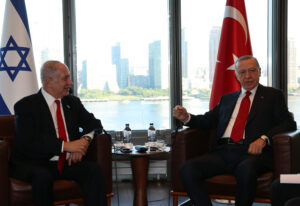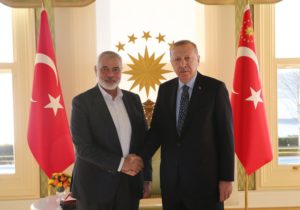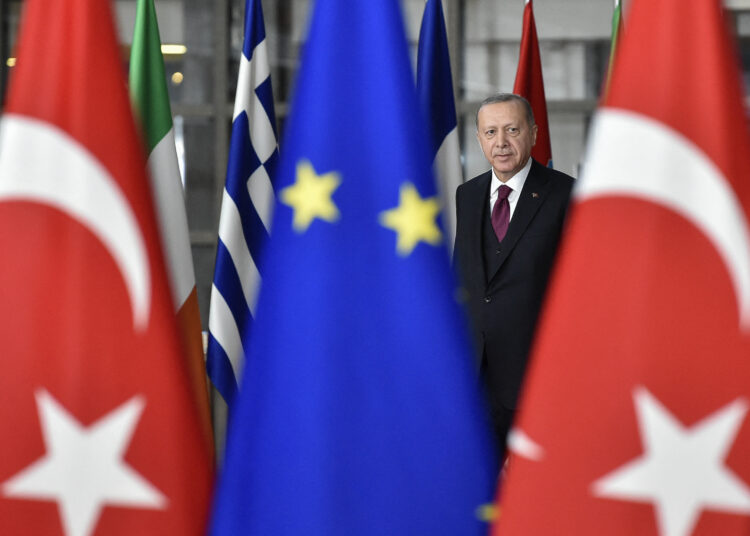Levent Kenez/Stockholm
In its annual report on Turkey released on Wednesday, the European Commission stated that Turkey’s unilateral foreign policy contradicts the EU’s priorities under the Common Foreign and Security Policy (CFSP). Additionally, the commission said Turkey’s supportive rhetoric towards the terrorist group Hamas, following its attacks on Israel on October 7, is in disagreement with the approach taken by the European Union.
The European Commission’s report highlights EU candidate Turkey is an active and significant actor in the area of foreign policy, which constitutes an important element in the context of the EU-Turkey relationship. However, the report points out that Turkey’s foreign policy is at odds with the EU’s priorities within the CFSP. The alignment rate of Turkey with the EU’s stance on foreign and security policy stood at a mere 10 percent as of August 2023, compared to 8 percent in 2022, the report notes.
The report alleges that Turkey supports Hamas, which the EU considers a terrorist organization. The report specifically mentions Turkey’s backing of Hamas after its attacks on Israel on October 7, highlighting a complete disagreement with the EU approach.
The report also says that Turkey’s relations with Israel were re-launched in 2022. In August of that year, the countries decided to fully restore diplomatic ties, including the exchange of ambassadors. Furthermore, in September 2023, the Turkish president engaged in talks with the Israeli prime minister, signaling a significant diplomatic shift.

Despite this diplomatic rapprochement, the report indicates that Turkey continues to criticize Israel’s actions in the occupied Palestinian territory. In particular Turkey expresses concerns about the status quo of the holy sites in Jerusalem. In the aftermath of the Hamas attacks on Israel last month, Turkey chose not to condemn or categorize them as terrorism. Instead, Turkey strongly criticized Israel’s response to the attacks, the European Commission notes.
The report notes that Turkey strongly condemned the loss of civilian lives on both sides and proposed to act as a mediator between Israel and Hamas. Currently, Turkey is in the process of re-evaluating its ties with Israel. Regarding the Middle East Peace Process, the report highlights that Turkey’s position aligns with the EU’s stance, supporting a two-state solution.
Turkey, expressing strong dissatisfaction with the commission’s report in a statement released by the Ministry of Foreign Affairs, harshly criticized the European Union’s policies in the Israel-Hamas conflict.
“We in fact take it as praise attempts by the EU to criticize Türkiye‘s principled stance regarding the Hamas-Israel War. The EU is on the wrong side of history in the face of a massacre that is reminiscent of the darkness of medieval times. The EU must remember that policies based on universal values, international law, and humanitarian principles cannot be limited to Ukraine or other regions of Europe but must be pursued universally, including the Middle East,” the ministerial statement reads.
Nordic Monitor previously reported that in the initial stages of the conflict, Turkish President Recep Tayyip Erdogan called for restraint from both sides, presenting a departure from his previous strong statements about Israel. Erdogan immediately called Israeli President Isaac Herzog to convey his condolences for the loss of life among Israelis. However, when this approach failed to garner the anticipated attention and he faced challenges in maintaining his balanced stance due to the intense Israeli military operation in Gaza and the resulting civilian casualties, triggering reactions within his political base, Erdogan later issued strong remarks regarding Israel’s extensive military operations, which have also reportedly killed thousands of civilians along with Hamas militants.
 He described Hamas as a liberation group engaged in a battle to protect its lands and people, rejecting the characterization of it as a terrorist group.
He described Hamas as a liberation group engaged in a battle to protect its lands and people, rejecting the characterization of it as a terrorist group.
In a telephone conversation with Hamas leader Ismail Haniyeh on October 22, Erdogan emphasized Turkey’s commitment to working towards an immediate ceasefire in the region.
However, Erdogan has no intention of severing diplomatic ties with Israel. Speaking to pro-government journalists upon his return from Kazakhstan on Saturday, he indicated that Turkish intelligence continues to engage with the Israeli side. But he said, “Israeli Prime Minister Benjamin Netanyahu is no longer someone we can talk to. We have written him off.”
“Completely cutting ties, especially in international diplomacy, is not possible. Therefore, with the efforts of Foreign Minister Hakan Fidan, National Intelligence Organization Chief Ibrahim Kalın and my other ministerial colleagues, we are using all diplomatic tools to end the conflict and we will continue to do so,” he told journalists.
Meanwhile, the government’s increasingly pro-Hamas narrative, voiced by high-ranking officials, has been widely propagated through the extensive media apparatus and the Diyanet, overseeing approximately 80,000 mosques in Turkey and abroad.
Radical groups aligned with the Erdogan government, including the Foundation for Human Rights and Freedoms and Humanitarian Relief (IHH), Turkey’s Hizbullah, the Great Eastern Islamic Raiders Front (IBDA/C or IBDA-C) and other Islamist organizations, have organized street demonstrations in front of Israeli and US embassies and consulates.
As a result of this extensive campaign in Turkey, there has been a noticeable rise in antisemitism, negatively impacting the cohesion of Turkish society. This trend could potentially escalate, posing an increased risk of violent and terrorist attacks against Jews and individuals critical of Hamas.
Text of the European Commission report:












